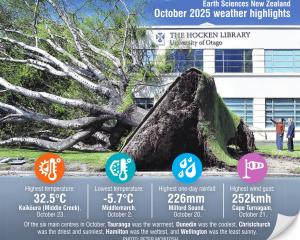

Universities Minister Dr Shane Reti announced yesterday a boost to high demand Stem subjects (science, technology, engineering and maths), along with initial teacher education and other priority health workforce areas.
This is on top of the broader 3% increase in tuition subsidies, meaning, in total, Stem and other higher priority subjects will attract a 4.75% tuition cost subsidy increase at degree level and above.
Budget 2025 also proposes universities would be able to implement an annual maximum fee rise of 6% for next year, similar to this year’s increase in fees.

"Together, the targeted funding rate increases and the proposed fee increase will support tertiary education and training providers to sustain the quality of provision and further invest in priority areas."
Otago University vice-chancellor Grant Robertson said this was a disappointing Budget for the tertiary sector.
"Funding for the sector has gone down overall, and there are not resources to keep up with increasing costs that universities face."

"That is somewhat made up for with funding rate increases for some areas [such as science and medicine] which means, on our initial calculations, Otago claws back much of the lost top-up funding at an overall university level.
"However, funding for commerce and humanities decreases.
"This undermines our ability to work collaboratively across disciplines to help solve the big challenges facing our world."
Mr Robertson said the university needed to continue to find savings and build revenue opportunities across the university to meet the financial expectations set by the government.

Green MP Francisco Hernandez said this year’s Budget made about $162million in "raw" cuts across the entire tertiary sector in terms of total appropriations, which could be significantly more once inflation was factored into proceedings.
"So, overall it’s quite a big cut to the tertiary sector and obviously that’s going to be quite bad for Dunedin."
Tertiary Education Union co-president Craig Marshall, of Otago University, said the government’s approach illustrated "a failure to understand what a proper education system is".
"For funding on Stem to almost match inflation is beneficial, but most universities would be looking at ways of ensuring that their humanities programmes remain viable.

"Humanities tell us about the way people think, which is something we also need to know."
Otago University Students’ Association president Liam White said he was surprised about the announcement of the proposed 6% increase in university fees.
"No-one likes to see increases, but to be honest, I was expecting it to be more — it does mean that universities will have to find more of the savings.
"I mean, it really makes me quite nervous for the future of the university.
"I think it could be quite grim for humanities."











